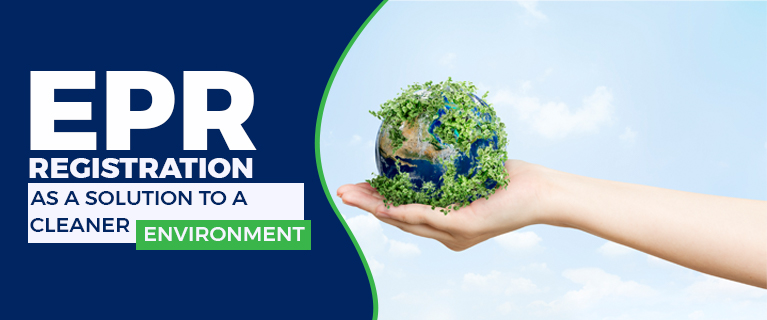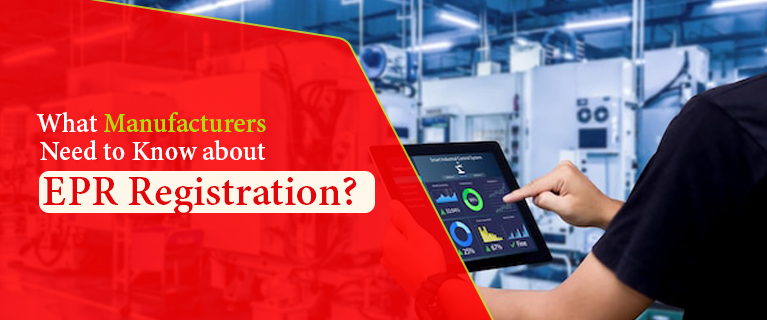EPR Registration As A Solution To A Cleaner Environment
In recent years, the global community has become increasingly aware of the environmental challenges facing our planet. One such challenge is the management of waste generated from various industries and consumer products. To address this issue and promote sustainable waste management practices, many countries and regions have implemented Extended Producer Responsibility (EPR) programs. EPR Registration is a crucial step towards creating a cleaner environment and achieving a more sustainable future. In this blog, we will explore how EPR Registration serves as a solution to a cleaner environment.
1. What is EPR Registration?
Extended Producer Responsibility (EPR) is a legal term that holds manufacturers responsible for every stage of the production process, especially the management of post-consumer waste. EPR Registration is the process by which producers register themselves with the relevant authorities to fulfil their responsibilities under the EPR framework. By registering, producers commit to taking ownership of the environmental impact of their products, from production to disposal.
2. Encouraging Sustainable Product Design:
EPR Registration incentivizes producers to adopt sustainable product design practices. When producers are responsible for the end-of-life management of their products, they are motivated to design products that are easier to recycle, repair, or safely dispose of. This encourages the use of environmentally friendly materials, reduces waste generation, and promotes the development of products with a longer lifespan.
3. Efficient Waste Management Systems:
EPR Registration fosters the development of efficient waste management systems. Producers are required to establish collection and recycling mechanisms for their products, ensuring that they are properly managed at the end of their life cycle. By implementing effective waste management systems, EPR Registration reduces the amount of waste sent to landfills, minimises environmental pollution, and conserves natural resources.
4. Reduction of Environmental Impact:
EPR Registration significantly reduces the environmental impact of products. Through responsible waste management practices, such as recycling and proper disposal, EPR programs prevent the release of hazardous substances into the environment and minimize pollution. By encouraging producers to adopt environmentally friendly practices, EPR Registration promotes resource conservation and helps combat climate change.
5. Promotion of Circular Economy:
EPR Registration plays a vital role in promoting a circular economy. A circular economy aims to minimise waste and keep resources in use for as long as possible through recycling, reusing, and repairing products. By making producers responsible for the entire life cycle of their products, EPR Registration encourages the adoption of circular economy principles. This leads to a more sustainable use of resources, reduced consumption of raw materials, and decreased dependence on landfills.
6. Collaboration and Stakeholder Engagement:
EPR Registration encourages collaboration among producers, consumers, and waste management organisations. Producers work closely with stakeholders to develop efficient waste collection and recycling systems, ensuring the smooth implementation of EPR programs. This collaboration fosters innovation, knowledge sharing, and the development of best practices, resulting in more effective and sustainable waste management strategies.
7. Consumer Awareness and Participation:
EPR Registration raises consumer awareness about the environmental impact of products and empowers them to make sustainable choices. Through labelling and public awareness campaigns, consumers are informed about the importance of choosing products from registered producers. This enables consumers to actively participate in creating a cleaner environment by supporting EPR-compliant products and engaging in responsible consumption practices.
Read Also This - Financial Implications of EPR Registration8. Financial Incentives and Cost Savings:
EPR Registration offers financial incentives for producers who adopt sustainable practices. By efficiently managing their products' end-of-life phase, producers can reduce disposal costs and potentially generate revenue through recycling and material recovery. EPR Registration encourages producers to adopt cost-effective strategies that benefit both the environment and their bottom line.
9. Regulatory Compliance:
EPR Registration ensures that producers comply with waste management regulations and environmental standards. Producers are required to meet specific targets for waste collection, recycling, and disposal, as outlined by the relevant authorities. By registering and adhering to these regulations, producers demonstrate their commitment to environmental stewardship and contribute to a cleaner and healthier environment.
10. Global Relevance:
EPR Registration is gaining global recognition and adoption as a solution to environmental challenges. Many countries and regions have implemented EPR programs, demonstrating a shared commitment to sustainable waste management practices. By participating in EPR Registration, producers can align themselves with global sustainability goals and contribute to international efforts to address climate change, resource depletion, and pollution.
Read Also This - The Role of EPR Registration in Building a Circular EconomyConclusion:
EPR Registration serves as a powerful solution to create a cleaner environment by holding producers accountable for the environmental impact of their products. By incentivizing sustainable product design, promoting efficient waste management systems, reducing environmental impact, and fostering a circular economy, EPR Registration contributes to a more sustainable and resilient future. Through collaboration, consumer awareness, and financial incentives, EPR Registration encourages responsible consumption and participation from all stakeholders. As the world becomes increasingly aware of the importance of environmental sustainability, EPR Registration emerges as a key driver for achieving a cleaner and healthier environment for present and future generations. Embracing EPR Registration is a crucial step towards building a more sustainable and prosperous world.




Comments
Post a Comment